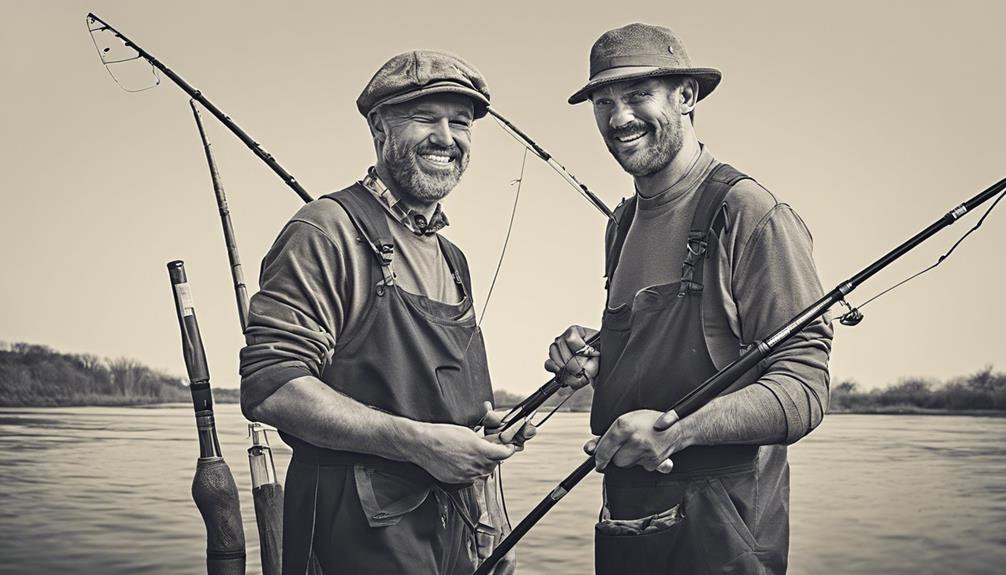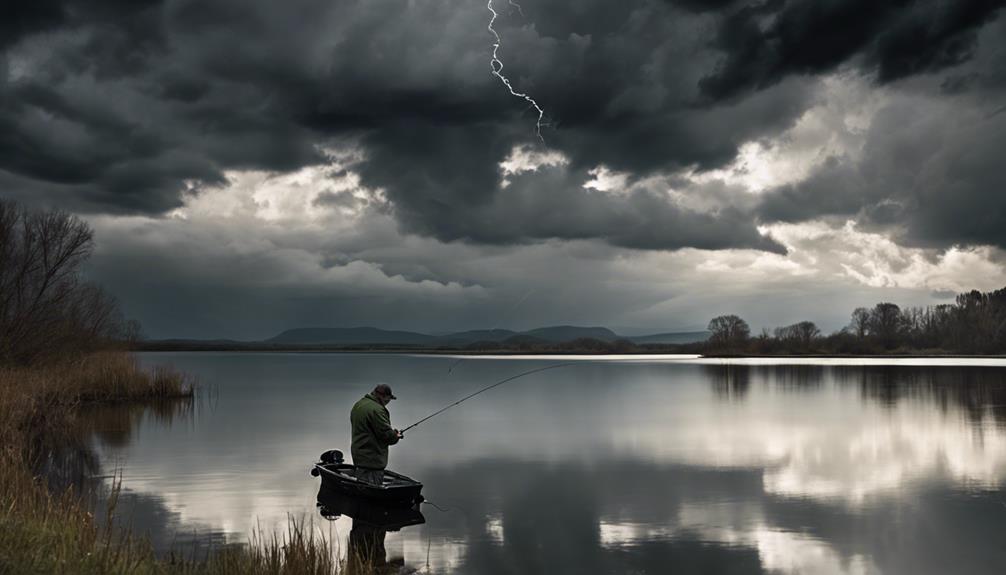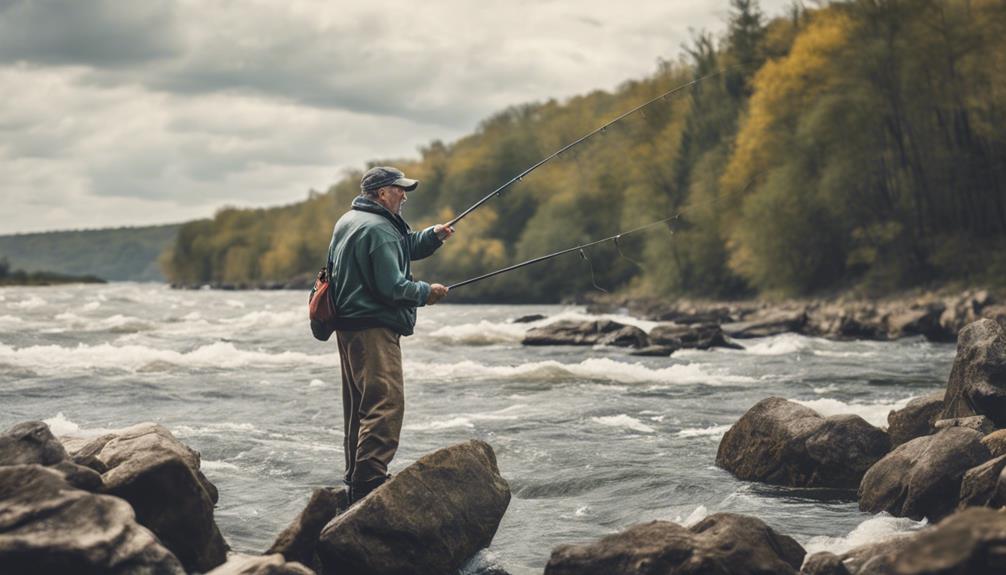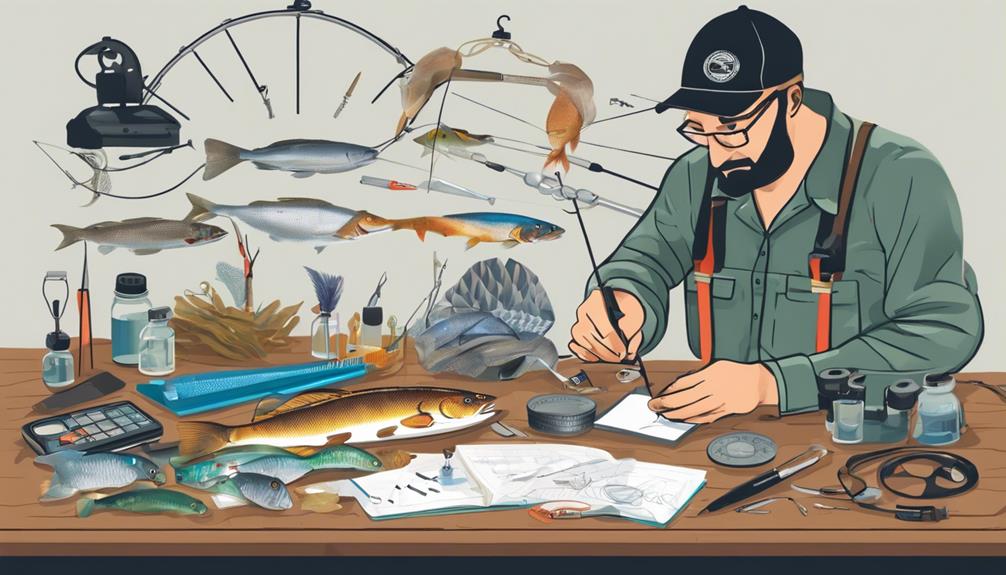You might think that fishing is just fishing, but when it comes to competitive angling versus leisure fishing, the differences might surprise you.
While both activities involve casting a line, the approach and motivations behind each can vary significantly. Competitive angling demands a level of skill, dedication, and strategy that sets it apart from leisure fishing.
As you explore the nuances of these two fishing styles, you'll uncover intriguing insights that shed light on the diverse world of angling pursuits.
Rules and Regulations in Competitive Angling
When competing in angling tournaments, adherence to strict rules and regulations is paramount for ensuring fair play and sportsmanship. Conservation practices are at the core of these rules, emphasizing the importance of protecting the environment and its inhabitants. As an angler, it's crucial to follow catch limits, release undersized fish, and avoid damaging habitats. By upholding conservation practices, you contribute to the sustainability of fish populations and the overall health of aquatic ecosystems.
Ethical standards also play a significant role in competitive angling. Honesty and integrity are essential when reporting catches and following tournament guidelines. Cheating, such as falsifying catch sizes or breaking rules, not only goes against the spirit of the sport but also undermines the credibility of the competition. As a competitive angler, it's your responsibility to uphold ethical standards, even when faced with the pressure to win.
Techniques and Strategies for Competitive Angling
To excel in competitive angling, mastering specialized techniques and strategic approaches is essential. When it comes to bait selection, understanding the preferences of the target fish species is crucial. Different fish are attracted to specific types of bait, so research and experimentation are key. Additionally, mastering various casting techniques can give you an edge. Practice accuracy and distance casting to ensure your bait reaches the desired spot efficiently.
Reading water and understanding fish behavior are also vital components of competitive angling. Observing the water for signs of fish activity such as ripples, bubbles, or birds diving can lead you to potential hotspots. Knowing the behavior patterns of the fish you're targeting can help you anticipate their movements and adjust your strategy accordingly. For example, some fish are more active during certain times of the day, so planning your angling schedule around these behaviors can increase your chances of success.
In competitive angling, the ability to adapt quickly to changing conditions is paramount. Stay flexible with your techniques and strategies, and be willing to switch up your bait selection or casting approach if the situation calls for it. By honing these skills and staying attuned to the nuances of the water and fish behavior, you can increase your chances of achieving success in competitive angling.
Gear and Equipment in Competitive Angling
Understanding the significance of gear and equipment is crucial in competitive angling to enhance your performance and increase your chances of success. Proper equipment maintenance and gear customization are essential for optimal performance on the water. Here are four key points to consider:
- Regular Equipment Maintenance: Regularly check and maintain your gear to ensure it's in top condition. This includes inspecting rods, reels, lines, and other equipment for any wear and tear. Proper maintenance can prevent malfunctions during crucial moments in a competition.
- Gear Customization: Customize your gear to suit your fishing style and the specific conditions of the competition waters. This could involve adjusting rod lengths, reel settings, or even creating specialized rigs to target certain fish species effectively.
- Fishing Techniques: Experiment with different fishing techniques to expand your skill set. Practice casting accurately, working different baits, and mastering various retrieval methods to adapt to changing conditions swiftly.
- Skill Development: Continuously work on improving your angling skills. Stay updated on the latest techniques, participate in workshops or seminars, and learn from experienced anglers to enhance your competitive edge.
Training and Preparation for Competitive Angling
Enhance your competitive edge in angling tournaments by focusing on training and preparation to optimize your performance on the water. Training techniques play a crucial role in preparing for competitive angling. To improve your skills, consider practicing casting accuracy, line control, and fish-fighting techniques regularly. Set up targets in your backyard or local park to practice casting accuracy, and use different lures to enhance your versatility in various fishing scenarios. Additionally, simulate tournament conditions by practicing fishing in different weather conditions and water bodies to adapt to various challenges you may face during competitions.
Mental preparation is equally important in competitive angling. Develop a pre-tournament routine that helps you stay focused and calm under pressure. Visualize different fishing scenarios and strategize how you'd react to them. This mental rehearsal can help you make quick and effective decisions during tournaments. Furthermore, practice mindfulness techniques such as deep breathing or meditation to maintain a clear and focused mind while on the water.
Rewards and Prizes in Competitive Angling
Competitive angling offers participants the opportunity to win a variety of rewards and prizes for their fishing skills and performance. When you engage in competitive angling, you open yourself up to a world of possibilities beyond just the thrill of the catch. Here are some of the rewards and prizes you can look forward to:
- Cash Prizes: Competitions often offer substantial cash prizes for top performers. These monetary rewards can range from hundreds to thousands of dollars, providing a tangible incentive to excel in your angling pursuits.
- Trophies: In addition to cash prizes, winners of competitive angling events often receive trophies or plaques to commemorate their achievement. These physical symbols of success can be proudly displayed and serve as a reminder of your fishing prowess.
- Sponsorship Deals: Exceptional anglers may attract the attention of sponsors who are willing to support them in exchange for promotion or representation. Securing a sponsorship deal can't only bring in financial benefits but also open doors to new opportunities within the angling community.
- Endorsements: Successful competitive anglers may also receive endorsements from fishing-related brands or companies. These endorsements can lead to product partnerships, promotional campaigns, and increased visibility within the industry, further solidifying your status as a respected angler.
Community and Camaraderie in Competitive Angling
Moving from the realm of rewards and prizes in competitive angling, the sense of community and camaraderie among participants is a defining aspect of the sport. In competitive angling, team dynamics play a crucial role in fostering a strong sense of belonging and cooperation. Anglers often form teams or clubs, working together to strategize, share tips, and support each other during competitions. This collaboration not only enhances the overall experience but also creates lasting bonds among participants.
Sportsmanship is another key element that contributes to the community spirit in competitive angling. Anglers are encouraged to display fair play, respect for fellow competitors, and integrity in following the rules and regulations of the sport. Good sportsmanship not only elevates the competitive environment but also sets a positive example for others to follow. Whether in victory or defeat, maintaining a gracious and respectful attitude towards other anglers is highly valued in the angling community.
Through the shared passion for the sport, competitive anglers come together to celebrate successes, learn from challenges, and grow both individually and as a group. The camaraderie forged on the waters transcends mere competition, creating a supportive network where friendships flourish and a sense of unity prevails. In the world of competitive angling, the community plays a vital role in shaping the overall experience and making it more than just a competition—it becomes a shared journey of camaraderie and mutual respect.
Impact on Fish Populations in Competitive Angling
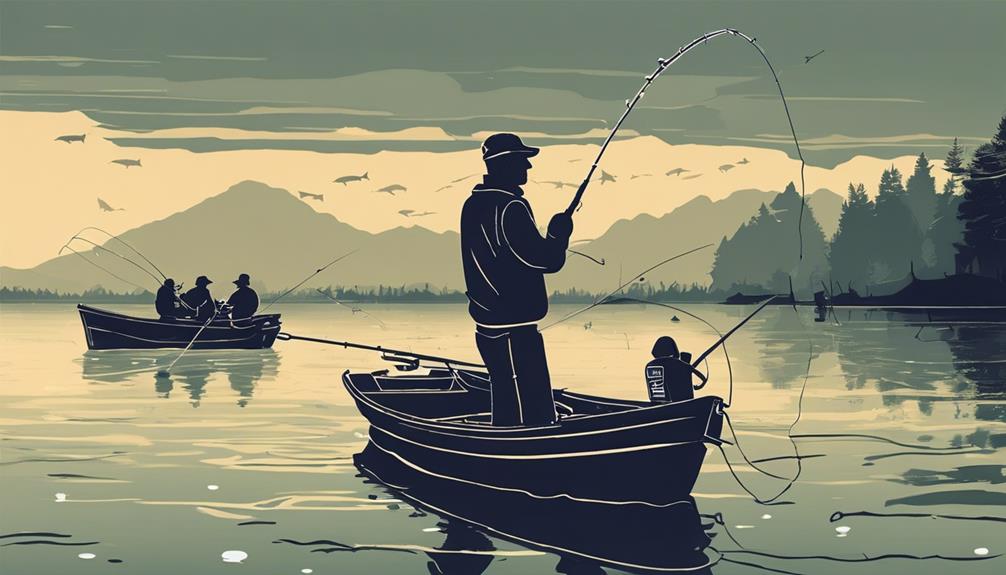
The participation of anglers in competitive fishing tournaments can have a significant impact on fish populations in various bodies of water. Here's how this impact unfolds:
- Overfishing Concerns: Competitive angling events, especially those with large numbers of participants, can lead to increased fishing pressure on certain fish species. This heightened pressure can result in overfishing if not managed properly through conservation efforts.
- Altered Population Dynamics: The constant removal of larger fish during tournaments can disrupt natural fish population dynamics. Targeting the biggest fish for competition can skew the age and size distribution within the population, affecting breeding patterns and overall ecosystem balance.
- Ecological Consequences: The ecological impact of competitive angling extends beyond just the targeted fish species. By altering the abundance of certain fish populations, there can be ripple effects throughout the food chain and habitat structure, potentially affecting other aquatic organisms and the ecosystem as a whole.
- Need for Sustainable Practices: To mitigate the negative effects on fish populations, it's essential for competitive anglers to adopt sustainable practices. This includes adhering to catch limits, practicing catch and release where appropriate, supporting habitat restoration efforts, and participating in conservation initiatives to ensure the long-term health of fish populations and their habitats.
Competitive Angling Events and Tournaments
Hosting various angling events and tournaments can bring together skilled anglers to showcase their abilities and compete for prizes in a spirited atmosphere. These events not only provide a platform for anglers to demonstrate their expertise but also offer unique opportunities for sponsorship and networking. Companies looking to reach a targeted audience often sponsor these events, gaining exposure among passionate anglers and fishing enthusiasts.
Moreover, competitive angling tournaments attract media coverage, further amplifying the reach of the event and the sponsors involved. This exposure not only benefits the sponsors but also helps promote the sport to a wider audience, potentially increasing interest and participation in angling. Spectator engagement is another crucial aspect of these events, as enthusiastic crowds add to the competitive atmosphere and create a sense of camaraderie among participants and viewers alike.
Networking events organized around these tournaments provide a valuable opportunity for anglers to connect with like-minded individuals, share techniques, and build relationships within the angling community. Additionally, these gatherings foster a sense of community and sportsmanship, enhancing the overall experience for participants and attendees. Overall, competitive angling events and tournaments play a significant role in promoting the sport, providing a platform for skillful anglers to shine, and creating a vibrant environment for sponsors, participants, and spectators.
Frequently Asked Questions
How Does Competitive Angling Affect the Mental Health and Overall Well-Being of Participants?
When you engage in competitive angling, the mental health benefits can be significant. The thrill of the competition and the focus required can give you a sense of achievement and purpose.
However, it's essential to be aware of the competitive stressors that come with it. Learning to manage these stressors and finding a balance between the competitive drive and your well-being is key to enjoying the sport while maintaining good mental health.
Are There Any Environmental Conservation Efforts or Initiatives Associated With Competitive Angling?
When it comes to environmental conservation efforts in competitive angling, there are various initiatives that focus on sustainable practices. Competitions often promote catch-and-release techniques to minimize impact on fish populations.
Additionally, many anglers engage in habitat restoration projects and participate in clean-up activities to preserve the natural surroundings. By prioritizing conservation, competitive anglers play a crucial role in ensuring the longevity of aquatic ecosystems for future generations to enjoy.
What Role Does Technology Play in Competitive Angling, if Any?
In competitive angling, technology shapes the game. From advanced fishing gear to data analytics, anglers utilize technological advancements for an edge.
Innovations in fish tracking help locate prized catches. High-tech equipment like sonar and GPS aid in pinpointing fishing spots. Data analysis provides insights into fish behavior.
Embracing technology enhances the competitive angling experience, giving competitors tools to strategize and improve their chances of success.
How Do Sponsors and Endorsements Factor Into Competitive Angling?
Sponsorship deals and endorsements are crucial in competitive angling. They provide financial incentives and rewards for anglers, helping cover expenses and boost their profiles. These partnerships often involve promoting brands or products in exchange for support.
Is There a Difference in the Demographics of Participants Between Competitive Angling and Leisure Fishing?
When it comes to the demographics of participants in competitive angling versus leisure fishing, there are differences in age groups and income levels. Urban areas tend to have more competitive anglers who are younger and have higher incomes, while leisure fishing attracts a wider range of ages and income levels, including more rural participants.
The competitive scene tends to skew towards a younger, more affluent demographic, whereas leisure fishing is more diverse in terms of participants.
Conclusion
In conclusion, competitive angling and leisure fishing offer different experiences and challenges.
While competitive angling requires specific techniques, gear, and training, it also provides opportunities for rewards and prizes.
On the other hand, leisure fishing allows for a more relaxed and enjoyable experience with a focus on camaraderie and conservation.
Both activities have their own merits and appeal to different individuals based on their preferences and goals.
